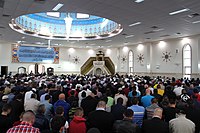| Grand Mufti of Australia | |
|---|---|
since 2011-2018; 2018-present | |
| Office of the Grand Mufti of Australia | |
| Style | Sunni tradition of Islam |
| Status | Muslim cleric |
| Term length | No fixed term |
| Formation | 1992 |
| Website | https://www.anic.org.au/ |
| Part of a series on |
| Islam in Australia |
|---|
 |
| History |
|
| Mosques |
| Organisations |
| Islamic organisations in Australia |
| Groups |
| Events |
| National Mosque Open Day |
| People |
The Grand Mufti of Australia is a Sunni Muslim cleric, or Grand Mufti, chosen to represent and answer questions from the growing Muslim population.[1][2] Nominated by the Australian National Imams Council (ANIC), the current Grand Mufti of Australia since 2018 is Ibrahim Abu Mohammed. Mohammed previously held the position from 2011–2018, and became Grand Mufti again after his successor, Abdel Aziem Al-Afifi died in office after a four-month tenure.[3][4]
ANIC's vision with the Grand Mufti was to unite the Australian Islamic community under a single leader and promote harmony and integration between Muslims and non-Muslims.[1]
The Mufti has a responsibility to issue fatwas, which are formal verdicts regarding Islamic law, in response to a question posed by a private individual or judge.[5]
The practicality of a Grand Mufti in Australia has been criticised by scholars such as Abdalla (2011),[1] who states that a singular mufti only offers the mainstream interpretation of Islam, and that this is unrepresentative of the diverse Australian Islamic community. He proposes the formation of a council of imams from different traditions such as Shia, Zaidi and Ismaili, and specialists in medicine, law and finance, stating this would be better source of guidance for Australian Muslims.
- ^ a b c Abdalla, Mohamad (2011). "Do Australian Muslims need a mufti?". Law and Religion in Public Life : The Contemporary Debate (1st ed.). Taylor & Francis Group. pp. 214–228.
- ^ Gebara, Rawaa E. A. (2015). Ijtihād and its relevance to Muslims in Australia (MSc). Charles Sturt University.
- ^ Cite error: The named reference
AAAAwas invoked but never defined (see the help page). - ^ Cite error: The named reference
2018-07-11_ABCwas invoked but never defined (see the help page). - ^ Black, Ann; Hosen, Nadirsyah (2009). "Fatwas: Their Role in Contemporary Secular Australia". Griffith Law Review. 18 (2): 405–427. doi:10.1080/10383441.2009.10854648. hdl:10072/30587. S2CID 220273008.
